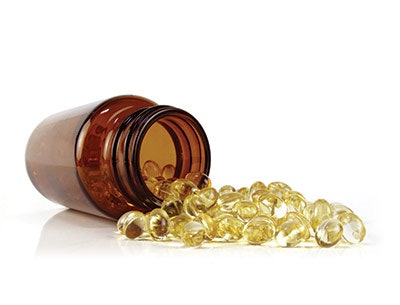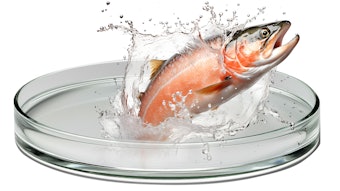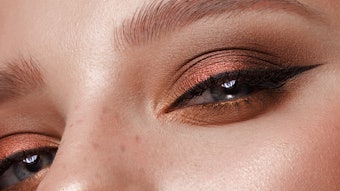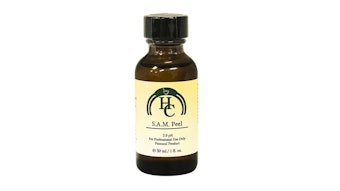
Psoriasis is a common skin condition that speeds up the lifecycle of skin cells and causes cells to build up rapidly on the surface of the skin. The extra skin cells form scales and red patches that are itchy and sometimes painful.1 Scientists believe that at least 10% of people inherit one or more of the genes that could eventually lead to psoriasis. However, only 2-3% of the population develops the disease. Researchers believe that to develop psoriasis, a person must have a combination of the genes that cause psoriasis and be exposed to specific external factors known as “triggers.”2
What It Is
Psoriasis presents itself in five main types, which include plague, guttate, inverse, pustular and erythrodermic.3 There is no set cause identified, but genetic, immune and environmental factors are implicated. Using a great intake form at a client’s initial visit to go over lifestyle, allergies, medication, etc. will help show triggers that cause their flare-ups while helping you determine which treatments and products will be harmful or helpful as well.
The scales and red patches are itchy and can occur all over the body including the nails and scalp. It is not contagious, and it usually shows up on both men and women in the early adolescent years.
"An estimated 2-3% of the U.S. population develops Psoriasis."
What It Isn’t
Psoriasis is often mistaken for other skin conditions such as eczema and seborrheic dermatitis or dandruff.
Eczema can present itself with red, peeling, inflamed, cracked and blistering skin. Psoriasis is more of a scaly build-up and eczema is not. Eczema, or atopic dermatitis, is more common than psoriasis.4
Seborrheic dermatitis is commonly called dandruff when found on the scalp, where psoriasis also can be found.5 Seborrheic dermatitis is considered a chronic form of eczema that appears on the body where there are a lot of oil-producing (sebaceous) glands like the upper back, nose and scalp. Psoriasis is much more likely on the scalp if a person has it on other parts of the body, and it is usually more painful than someone who has seborrheic dermatitis. The scales of psoriasis are thick and usually more silver or grey in color, while the scales of seborrheic dermatitis tend to be greasy and white or yellow in color.
Potential Triggers for Flare-Ups
When psoriasis is “triggered” and a flare-up occurs, common skin conditions arise. Below are some of the triggers that can cause psoriasis to flare.
Lifestyle. A person’s lifestyle choices may trigger a flare-up. Things like smoking, stress and heavy alcohol use will tend to cause reactions to the skin. Stress is a major cause, as it may affect the immune system and can also trigger more stress, causing a vicious cycle to repeat itself unless the client learns to reduce stress.
Choices of where a person may live, work or experience their hobbies may also affect flare-ups on the skin. Temperature extremes and even chemical exposure in the workplace or home may cause issues. Regular exposure to fragrances can also lead to migraines and cause stress that leads to a flare-up.
Hormones. Both men and women can get psoriasis. However, women see some more prevalent patterns with the disease in terms of higher risk of flare-ups. Puberty, post-pregnancy and menopause are three times in a woman’s life that the disease is more apparent. During pregnancy, many actually experience some relief from symptoms. Experts believe that estrogen’s anti-inflammatory effect is responsible for the reduction of psoriasis symptoms during pregnancy.
Diet. Clients with psoriasis should also discuss possible diet options with their physician. Some foods are known to trigger flare-ups and others actually can help reduce the inflammation in the skin. Food known to cause flare-ups include: alcohol, gluten, nightshade foods (tomatoes, white potatoes, eggplant), red meats including processed ones like sausage, junk food, dairy, refined sugar, citrus, certain condiments and spices.6 Inflammatory issues, obesity and diabetes are also possible conditions that may trigger a flare-up and another good reason for a person to look at their diet. Low levels of vitamin D levels may also affect the immune system leading to more scaling and itching.
Skin infection/injury. If someone has psoriasis, it is recommended they wear gloves when performing tasks like gardening. Cuts, scrapes and even bug bites can set off a reaction. Recent illness affecting the immune system may also trigger the skin to be irritated. Yeast infections, thrush, strep throat, respiratory infections and staph infections are all known triggers for the disorder.
Medications. While medications help a person get healthier, they also may cause psoriasis flare-ups. People suffering from psoriasis should always let any physician know they have been diagnosed. Some medications for diseases like high blood pressure, malaria prevention, arthritis and mood disorders may trigger a flare-up. These are a few of the common medications known to trigger an outbreak: lithium, Inderal, quinidine, indomethacin and antimalarials (Plaquenil, Quinacrine, Chloroquine and Hydroxychloroquine).7
Treatment Room Guidance

The tools and materials you use in the spa may also trigger psoriasis. Utilize the below guidelines and help reduce your contribution to flare-ups for clients.
Linens. Consider using sheets that are microfiber or high thread count and towels that are extra soft. Pilled or rough linens will make the service uncomfortable for a client with psoriasis, possibly causing stress versus relaxation. Make sure to use fragrance-free detergents, as fragrance and alcohols in them can be irritating to many. Also, use lukewarm to cool versus steamed towels on a client with psoriasis.
Sanitation. While many skin care professionals do not wear gloves, it is recommended when working on someone with this condition. It is a protection for them, so they do not get any other infections like cellulitis, a form of staph.8 Keeping your treatment room extra clean and sanitized will be helpful, as this client will be more prone to infections.
Skin Care Treatment
The barrier function is definitely compromised in the psoriasis client. Products that are calming, hydrating and targeted to barrier repair will be effective in aiding skin inflammation. Ingredients like calamine, Mirabilis jalapa, tamanu oil, rose hip oil and figwort will relieve the scratching and inflammation factors.9
Salicylic acid is classified as a keratolytic, or peeling agent, and works by causing the outer layer of skin to shed. It is a common and effective treatment for a wide variety of skin problems. As a psoriasis treatment, it acts as a scale lifter, to soften and remove psoriasis scales.10 Heavy butters like shea can be effective, as the richness helps keep the skin moisturized. Also, try and use sulfate and fragrance-free products to avoid triggering any flare-ups.
Professional Treatments
Unless approved by a physician, it is best to avoid more aggressive treatments like microneedling, microdermabrasion and laser on the psoriasis client. There are several contraindications with performing any type of chemical peel as well.
Massage therapy. Massage can be helpful to reduce flare-ups since it can reduce stress. Avoid massaging on infected areas that may be painful. Use massage products that do not contain fragrances and avoid trigger ingredients when massaging a client with psoriasis. Also, ensure that the environment in the room including sound and bedding are free of stress.
Light therapy. LED treatments, both red and blue, have shown positive results on the skin when there is a flare-up. Blue light helps with antibacterial issues on the skin so as not to induce more issues as infections are triggers. There are several modes of light therapy available for home use and the treatment room. LED beds can also help with someone who may have the condition on larger parts of the body.
Home Care
Educating your client on their home care routine will be helpful to reduce possible triggers. Stress the same items that you consider in the treatment room for them at home including: water temperature, types of products, linens, towels and relaxation tips. If their work or home environment has possible triggers, you may want to suggest protecting the skin in these situations.
Refer If Necessary
As skin care professionals, diagnosing psoriasis is out of our scope of practice. If you suspect this skin condition, send them to a physician to confirm. Work with the physician’s recommendations to educate clients on stress reducers and trigger avoidance. By understanding this skin condition and being able to offer some relief, we build a gratifying relationship with our client.
References
- www.mayoclinic.org/diseases-conditions/psoriasis/symptoms-causes/syc-20355840
- www.healthline.com/health/psoriasis/risk-factors
- www.psoriasis.org/about-psoriasis
- www.healthline.com/health-slideshow/psoriasis-vs-eczema-pictures
- www.healthline.com/health/psoriasis/psoriasis-vs-seborrheic-dermatitis#1
- www.everydayhealth.com/psoriasis/diet/foods-to-avoid-if-you-have-psoriasis/
- www.psoriasis.org/about-psoriasis/causes
- www.everydayhealth.com/psoriasis/symptoms/psoriasis-and-skin-infections/
- L Walker, The Skin Care Ingredient Handbook (Revised & Expanded Edition) Allured Business Media 2014.
- www.psoriasis.org/about-psoriasis/treatments/topicals/over-the-counter












